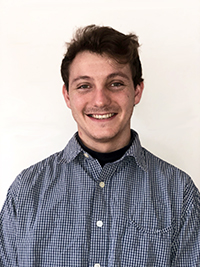 My experience in the Social Analysis and Research program (MSAR) thus far has been really great. Working alongside other graduate students and faculty members, this semester has solidified my interest in pursuing a doctoral program. Moreover, through a class with Professor of Environment and Society and Sociology, Scott Frickel, I have developed a growing interest in Environmental Sociology, which has imbued my own research goals and shaped my research practicum. And, maybe most importantly, I have truly enjoyed being part of the Brown sociology department community.
My experience in the Social Analysis and Research program (MSAR) thus far has been really great. Working alongside other graduate students and faculty members, this semester has solidified my interest in pursuing a doctoral program. Moreover, through a class with Professor of Environment and Society and Sociology, Scott Frickel, I have developed a growing interest in Environmental Sociology, which has imbued my own research goals and shaped my research practicum. And, maybe most importantly, I have truly enjoyed being part of the Brown sociology department community.
As the name suggests, MSAR intends to train students in advanced sociological techniques for data collection and analysis. This methodological training includes quantitative approaches – like survey research, demography, and statistical analysis – as well as qualitative ones – like ethnography, interviewing, and comparative historical analysis. In addition to a number of course requirements across the methodological spectrum, the program also includes a research practicum, either in the form of an internship or research assistance to a faculty member.
Through my coursework this semester I have been working to expand the research I conducted for my senior thesis that explores waterfront revitalization in a small post-industrial city along New York’s Hudson River, which is half an hour from where I grew up in Rhinebeck. Now as a master’s student with a burgeoning interest in Environmental Sociology, I have come to realize the ecological blinders in my past research. So, I am working on a new project to explore not only the social and economic but also the biophysical (or environmental) consequences of revitalization efforts that have transformed Poughkeepsie’s once-thriving but long-abandoned industrial waterfront into a public park consortium. The project combines interviews and observations with archival research on the many manufacturers that operated along the city’s riverfront and seeks to answer the fundamental question: what types of industrial contaminants were left behind and, in transforming the space into parks, how was the land remediated?
For my research practicum starting in January, I will serve as a research assistant to American environmental sociologist and professor of sociology and environmental science at Drexel University, Robert Brulle for a project on climate change denial in the United States.
I elected the MSAR program for two main reasons. I have long been interested in pursuing a PhD in Sociology, but, as my undergraduate education came to an end, I was not quite ready to embark on such an extensive endeavor. The MSAR program offered the opportunity to continue my sociological education without the same lengthy commitment – since beginning the program, however, I almost certainly intend to pursue a PhD in the coming years. And secondly, since my own research experience has been mostly in qualitative approaches to research, the MSAR program offered the opportunity to refine my quantitative toolkit.
Next year, after I graduate from the MSAR program and before I plan to pursue a PhD, I am hoping to do research focused on social and economic justice – either in an academic, nonprofit, or labor union setting.
More broadly speaking, I hope to marshal knowledge production to help collectively reimagine a more just, equitable, and sustainable world. To me, sociology is unique in its emancipatory potential. That is, the sociological imagination gives us the tools to transcend our own individual, myopic experiences and unearth the diverse and even incongruent structures that underlie our existence. Such sociological knowledge production is not merely an opportunity for ascension in the ranks of knowledge institutions, but a fundamental responsibility that we as knowledge producers – highly privileged and simultaneously obligated in our role – must honor. I am really interested in continuing to figure out how research can be part of a broader activist project; how knowledge produced in academic settings can be mobilized for positive change; and how knowledge itself might be forged and disseminated in a more public or democratic manner.
Nick Hoynes was born and raised in Rhinebeck, New York, a town about 100 miles north of New York City. His mom is a longtime school board member, who now does mediation. His father is a sociologist at Vassar College whose work focuses on media. Their lifetime commitment to both service and activism has long been an inspiration for him. Nick played on the men’s rugby team as an undergraduate at Brown and still supports the team at games, practices and social events.